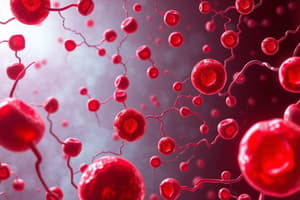Podcast
Questions and Answers
What is the primary role of Glucose transporter 1 (GLUT1) in red blood cells?
What is the primary role of Glucose transporter 1 (GLUT1) in red blood cells?
- Facilitating oxygen transport
- Generating a gated pore for glucose passage (correct)
- Regulating hemoglobin levels
- Transporting amino acids
What does anemia indicate regarding hemoglobin levels?
What does anemia indicate regarding hemoglobin levels?
- No change in hemoglobin levels
- Increase in red blood cell count
- Deficiency in circulating hemoglobin (correct)
- Elevated levels of circulating hemoglobin
What percentage of red blood cell membrane protein is accounted for by GLUT1?
What percentage of red blood cell membrane protein is accounted for by GLUT1?
- 2% (correct)
- 10%
- 5%
- 1%
Which statement is true about GLUT1's dependence on insulin?
Which statement is true about GLUT1's dependence on insulin?
What is a common consequence of a deficiency in circulating hemoglobin?
What is a common consequence of a deficiency in circulating hemoglobin?
What does GLUT1 do?
What does GLUT1 do?
What is anemia?
What is anemia?
What percentage of the protein in the membrane of RBC does GLUT1 account for?
What percentage of the protein in the membrane of RBC does GLUT1 account for?
GLUT1 is dependent on insulin.
GLUT1 is dependent on insulin.
Flashcards are hidden until you start studying
Study Notes
Biomedical Importance of Red Blood Cells
- Glucose transporter 1 (GLUT1) is crucial for glucose transport into red blood cells.
- GLUT1 functions by creating a gated pore in the cell membrane, allowing the passage of glucose.
- This transporter is responsible for approximately 2% of the total protein composition in the red blood cell membrane.
- GLUT1 operates independently of insulin, ensuring consistent glucose uptake regardless of insulin levels.
Anemia
- Anemia is characterized by a deficiency in circulating hemoglobin levels.
- A lower hemoglobin level can lead to decreased oxygen transport throughout the body, causing fatigue and weakness.
Biomedical Importance of Red Blood Cells
- Glucose transporter 1 (GLUT1) is crucial for glucose transport into red blood cells.
- GLUT1 functions by creating a gated pore in the cell membrane, allowing the passage of glucose.
- This transporter is responsible for approximately 2% of the total protein composition in the red blood cell membrane.
- GLUT1 operates independently of insulin, ensuring consistent glucose uptake regardless of insulin levels.
Anemia
- Anemia is characterized by a deficiency in circulating hemoglobin levels.
- A lower hemoglobin level can lead to decreased oxygen transport throughout the body, causing fatigue and weakness.
Studying That Suits You
Use AI to generate personalized quizzes and flashcards to suit your learning preferences.



